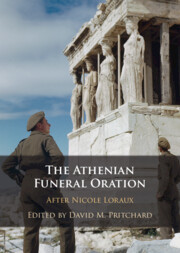Book contents
- The Athenian Funeral Oration
- The Athenian Funeral Oration
- Copyright page
- Contents
- Figures and Tables
- Contributors
- Foreword
- Preface
- Abbreviations
- 1 The Funeral Oration after Loraux
- Part I Contexts
- Part II The Historical Speeches
- 5 The Epitaphios Logos of Pericles: Thucydides’ Ambivalence towards the Genre
- 6 Demosthenes after the Defeat
- 7 Originality and Tradition in Hyperides’ Funeral Oration
- Part III The Literary Examples
- Part IV Intertextuality
- Part V The Language of Democracy
- References
- General Index
- Index of Sources
6 - Demosthenes after the Defeat
from Part II - The Historical Speeches
Published online by Cambridge University Press: 11 January 2024
- The Athenian Funeral Oration
- The Athenian Funeral Oration
- Copyright page
- Contents
- Figures and Tables
- Contributors
- Foreword
- Preface
- Abbreviations
- 1 The Funeral Oration after Loraux
- Part I Contexts
- Part II The Historical Speeches
- 5 The Epitaphios Logos of Pericles: Thucydides’ Ambivalence towards the Genre
- 6 Demosthenes after the Defeat
- 7 Originality and Tradition in Hyperides’ Funeral Oration
- Part III The Literary Examples
- Part IV Intertextuality
- Part V The Language of Democracy
- References
- General Index
- Index of Sources
Summary
There are two reasons why the funeral speech of Demosthenes has largely been ignored by ancient historians. The first reason is that it has always been judged as less important than the great funeral speeches of Pericles, Lysias and Hyperides. The second is that many ancient historians have thought it unworthy of Demosthenes in terms of content and style. The lack of sustained research on this funeral speech is thus unsurprising. This speech, however, is of considerable historical interest. Demosthenes, like other funeral orators, may have manipulated the genre’s commonplaces, but his speech is the only example of the surviving ones that had to react to a crushing Athenian defeat. In this situation, evoking the glorious past, which was a mainstay of the genre, seemed inappropriate. This chapter discusses the historical context of this neglected work and compares its lines of argumentation with those of other funeral speeches. It attempts to explain why Demosthenes delivered the funeral speech of 338 at all and why he said what he did.
Keywords
- Type
- Chapter
- Information
- The Athenian Funeral OrationAfter Nicole Loraux, pp. 140 - 156Publisher: Cambridge University PressPrint publication year: 2024

